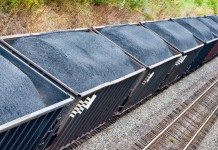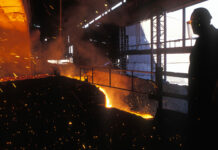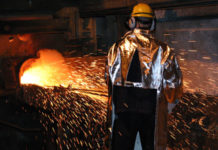
[miningmx.com] – Paul O’Flaherty, CEO of ArcelorMittal South Africa (AMSA), said his first six months at the company was heavily occupied with regaining the trust of the South African government. “The relationship was very dysfunctional,’ he said in an interview with Miningmx.
His hope now is that the government will support his request for tariffs in order to protect South Africa’s domestic steel production from some 1.6 million tonnes a year in cheap steel imports. “We have been given a sympathetic ear,’ he said of government negotiations.
Whether that will translate into substantive action is another matter.
There’s a theory out there that the last thing the government wants is to bail out a potential competitor, even if that does mean saving thousands of jobs. Already, Evraz Highveld announced on July 21 that it was entering into business rescue proceedings and that it would be suspending production in order to curtail costs.
An agreement was signed last year between the Industrial Development Corporation (IDC) and Hebei Steel to investigate building a steel plant in which the Chinese firm would have a 51% stake in return for financing it.
A feasibility study is currently underway and if it passes muster, the government will embark on its own steel-making facilities as a key part of its industrialisation policy.
It doesn’t need import protection, necessarily, as it will have a competitive advantage should legislation supporting developmental pricing of iron ore and coal be promulgated in terms of amendments in the Minerals & Petroleum Resources Development Act (MPRDA). The MPRDA is currently stranded in parliament, awaiting further dissection.
O’Flaherty acknowledges that conditions exist motivating government antipathy to his company. One is a paragraph in the Industrial Policy Action Plan which talks about increasing and building competition. “That is where the debate comes in,’ said O’Flaherty who was previously CFO at Eskom.
He added, however, that AMSA was prepared to make a number of concessions and commitments in return for winning the protection of the government, including settling its Competition Commission issues, discussing “a fairer price for steel,’ and following through on R4.5bn in specific projects in order to boost job creation. “We need tariff protection and localisation of steel in order to survive,’ he said.
Already, AMSA has alerted shareholders to the likelihood of restructuring its Vereeniging Works – facilities first opened in 1911 – affecting hundreds of jobs. There’s also the risk that the entire sector could be vulnerable to the downturn in world markets.
“We are talking about a steel industry that on a primary basis directly provides 200,000 jobs. That is what we are talking about,’ said O’Flaherty.
“Without the primary steel industry, the industrialisation in the National Development Plan would be extremely difficult. If we have to shut the entire industry, it would take ten to 15 years to build it. I don’t think that is an option,’ he added.
O’Flaherty is also hoping to renegotiate some 6.25 million tonnes in iron ore supply from Kumba Iron Ore, the Anglo American listed subsidiary, or source the iron ore from elsewhere as there are no take-or-pay conditions attached to the contract (although there are collars and floors). As far as industry ironies go, this is right up there.
ASMA and Kumba duked it out from 2010 to 2013 over ownership of a 21.3% stake in Sishen Iron Ore Company (SIOC) with the matter eventually ending up on appeal at the Consitutional Court.
In the end the cost plus sales arrangement between Kumba and AMSA was renegotiated whilst the sake in SIOC was awarded to Kumba, although with conditions attached, the details of which are still unknown.
It’s possible these conditions may ask Kumba to commit to a developmental pricing regime, possibly to a government initiative such as a steel facility, although whether that would be extended to O’Flaherty’s AMSA is anyone’s guess at the moment.
In the meantime, a key part of South Africa’s industrial landscape continues to struggle.
AMSA reported a R109m interim headline loss last week, a R103m deterioration over the R6m loss in interim earnings of the previous financial year and prospects for the international steel industry remain depressed.










